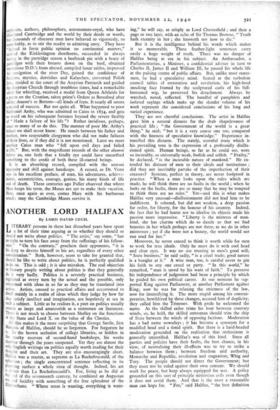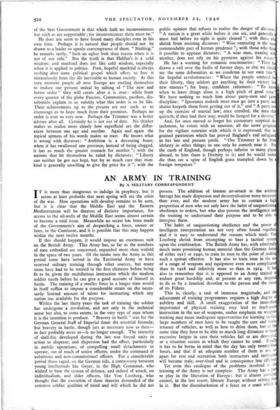ANOTHER LORD HALIFAX
By LORD DAVID CECIL
ITERARY persons in these last disturbed years have spent 1.1 a lot of their time arguing as to whether they 'should or should not write about politics. "The artist," say some, ." has no right to turn his face away from the sufferings of his fellow- men." "On the contrary," proclaim their opponents, "it is his duty to devote himself to his art, regardless of every other consideration." Both, however, .seem to take for granted that, should he him to write about politics, he is perfectly qualified to do so. This is odd ; it is also mistaken. The real objection to literary people writing about politics is that they generally do it very badly. Politics is a severely practical business, regulated at every turn by the actual and the possible, only concerned with ideas in so far as they may be 'translated into action. Artists, unused to practical affairs and• accustomed to dwell mainly in a realm of ideas which they judge by how far they satisfy intellect and imagination, are hopelessly at sea in such a subject. Little as he realises it, a poet on politics usually sounds as inept and amateurish as a statesman on literature. There is not much to choose between Shelley on the functions of tht State and Lord X. on the *value of the Classics.
All this makes it the more surprising that George Savile, first Marquis of Halifax, should be so forgotten. For forgotten he IS. In the brown seclusion of college libraries, or hidden in the murky recesses of second-hand bookshops, his works Slumber through the years unopened. Yet they are almost the °IllY English writings on politics equally worth reading for their thought and their art. They are also encouragingly short. Halifax was a master, as supreme as La Rochefoucauld, of the aphorism ; the single concentrated sentence reflecting in its gleaming surface a whole vista of thought. Indeed, his art IS richer than La Rochefoucauld's. For, living as he did at the t:nd of the seventeenth century, -he combined an Augustan Wit and lucidity with something of the free splendour of the Elizabethans: "Where sense is wanting, everything- is -want- ing," he will say, as crisply as Lord Chesterfield ; and then a page or two later, with an echo of Sir Thomas Browne, "Truth bath eternity in her ; she knoweth not how to die."
But it is the intelligence behind his words which makes it so memorable. These feather-light sentences carry easily a huge weight of truth. There was no danger of Halifax being at sea in his subject. An Ambassador, a Parliamentarian, a Minister, a confidential adviser in turn to Charles II, James ll and William III, he passed his whole life at the pulsing centre of public affairs. But, unlike most states- men, he had a speculative mind. Seated at the turbulent council tables of restoration and revolution, his high-bred mocking face framed by the sculptured curls of his full- bottomed wig, he preserved his detachment. Always he watched, noted, reflected. The handful of pamphlets and isolated sayings which make up the slender volume of his work represent the considered conclusions of his long and varied experience.
They are not cheerful conclusions. The artist in Halifax gave him a natural distaste for the drab shapelessness of practical life ; "the Government of the world is a great thing," he said; "but it is a very coarse one too, compared with the fineness of speculative knowledge." Experience in- tensified this distaste. The stately, scornful irony which is his prevailing tone is the expression of a profoundly disillu- sioned spirit. Human beings, so far as he could see, were so incurably, so universally weak, foolish and selfish. "Frailty," he declared, "is the incurable nature of mankind." He ex- tended his distrust of men to their ideals and institutions ; did they not inevitably partake of the imperfection of their creators? Systems, perfect in theory, are never foolproof in practice. "When a man looks upon the rules which are made, he will think there are no faults in the world ; when he looks on the faults, there are so many that he may be tempted to think there are no rules." Yet—and this is what makes Halifax very unusual—disillusionment did not lead him to be indifferent. It sobered, but did not weaken, a deep passion for order, for liberty, for the honour of his country. Indeed, the fact that he had learnt not to idealise its objects made his passion more impressive. "Liberty is the mistress of man- kind, she has charms which do so dazzle us that we find beauties in her which perhaps are not there, as we do in other mistresses ; yet if she were not a beauty, the world would not run mad for her."
Moreover, he never ceased to think it worth while for men to work for true ideals. Only he must do it with cool head and clear eyes. It was no use trusting to men's good will; "State business," he said sadly, "is a cruel trade; good nature is a bungler at it." A wise man, too, is careful never to pin his faith to any one creed or party. "In this world," he remarked, "man is saved by his want of faith." To preserve his independence of judgement had been a principle by which he guided his own political career. At one moment he sup- ported King against Parliament, at another Parliament against King; now he was for relaxing the strictness of the law, now for intensifying it. The more stupid among his contem- poraries, bewildered by these changes, accused him of duplicity; they called him the Trimmer. With pride he welcomed the name. As the skilled sailor trims his boat between contrary winds, so, he held, the skilled statesman should trim the ship of State between the winds of opposing factions. Moderation has a bad name nowadays ; it has become a synonym for a muddled head and a timid spirit. But there is a hard-headed moderation grounded on the realisation that enthusiasm is generally unjustified. Halifax's was of this kind. Since all parties and policies have their faults, the best chance, in his view, of neutralising their ill-effects was to try to strike a balance between them ; between freedom and authority, Monarchy and Republic, revolution and stagnation; Whig and Tory. The people should not direct the Government; but they must not be ruled against their own consent. We should work for peace, but keep always equipped for war. A policy grounded on this sort of principle minimises evils even though it does not avoid them. And that is the most a reasonable man can hope for. "For," said Halifax, "the best definition of the best Government is that which hath no inconveniences but such as are supportable ; for inconveniences there must be."
He does not seem to have found many disciples even in his own time. Perhaps it is natural that people should not be drawn to a leader so openly contemptuous of them. "Nothing," he remarks tartly, "bath an uglier look than reason when it is not of our side." But the truth is that Halifax's is a cold wisdom; and mankind does not like cold wisdom, especially when it is applied to politics. Poor, hopeful mankind is always rushing after some political gospel which offers to free it miraculously from the ills inevitable to human society. At this very moment people all over Europe are steeling themselves to endure our present ordeal by talking of "The new and better order" they will create after it is over : while from every quarter of the globe Fascists, Communists, pacifists, dis- tributists explain to us volubly what this order is to be like. Their achievements up to the present are not such as to encourage us to hope much from their promises. Perhaps no order is ever so very new. Perhaps the Trimmer was a better adviser after all. Certainly he is not out of date. No thinker makes us realise more clearly how superficial are the differ- ences between one age and another. Again and again the topical aptness of his words makes us start. He knows what Is wrong with dictators: "Ambition is a devouring beast; when it has swallowed one province, instead of being clogged, it has so much the greater stomach for another "; with the nations that let themselves be ruled by dictators: " Liberty can neither be got nor kept, but by so much care that man- kind is generally unwilling to give the price for it "; with the public opinion that refuses to realise the danger of dictators "A nation is a great while before it can see, and generally ' must feel before its sight is quite cleared "; with those shrink from resisting dictators: "Wise venturing is the mos commendable part of human prudence "; with those who t it possible to appease dictators: "A wise man, treating wi another, does not rely on his promises against his nature.
He has a warning for romantic reactionaries: "Time drawn a veil over the faults of former days, or else we shoul see the same deformities as we condemn in our own time" for hopeful revolutionaries: "When the people contend fo their liberty, they seldom get anything by their victory bu new masters "; for busy, confident reformers: "To kn when to leave things alone is a high pitch of good sense. We have nothing to teach him about party-men and par discipline: "Ignorance maketh most men go into a party an shame keepeth them from getting out of it," and "A party se up the exercise of martial law; once enrolled, the man tha quitteth, if they had their way, would be hanged for a deserter.'
And, for once moved to forget his customary sceptical de tachment, he voices with an emotion, all the more poignan for the vigilant restraint with which it is expressed, that in grained patriotism which has proved England's real safeguar in her late and present perils. "Our Trimmer is far fro idolatry in other things; in one only he cometh near it. Fo the earth of England, though perhaps inferior to many plac abroad, to him there is Divinity in it; and he would ratb die than see a spire of English grass trampled down by foreign trespasser."



























































 Previous page
Previous page